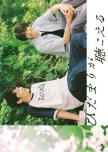A short drama that packs a lot of emotions, nuance, and representation.
There's a part in here that truly represents the whole essence of the show. It's when Taichi would intuitively repeat long conversations to Kohei. It conveyed the kindness that someone like Kohei needed in a world where he has grown tired of being pitied. Taichi taught him to ask if he didn't hear anything because it's not his fault to have hearing loss. It made Kohei happy, and it's the reassurance he needed to feel that he belongs in his world.
Kohei, who's quiet and reserved, found himself trapped in a bubble he created. And Taichi, who's naturally and flamboyantly loud, came into his life to burst that bubble - a college boy whose strides resemble his bubbly personality with a heart as big as his baggy pants. Isolated and withdrawn from the world he used to be a part of, Kohei finds solace in Taichi's reassurance. Their relationship progresses so naturally, letting us feel the emotions seep through our body and be fully immersed in their happiness, confusion, frustration, and all the fluttering feelings that come with growing up as young adults.
Kohei and Taichi aren't so good at communicating feelings, especially the latter. Things may not be said in words, and feelings can be lost in miscommunication, which has been the running theme in a lot of Japanese dramas. But in this case, it was buildup and hinted, seemingly wants us to be prepared for the incoming angst. It didn't feel like it appear out of the blue. The angst was given enough momentum to hit you directly right in the feels. Their ability to express emotions through nuance and visual actions is profound and an entrancing sight to watch. And the amorous and yearning glances say so much more than words.
I Hear the Sunspots is a coming of age story that explores the challenges of growing up with disability and as young adults. It's a representation for the hard of hearing people that's not just a mere inspiration porn for the able bodied. It has a commendable presentation of unique perspectives through various likeable and polarizing characters for us to better understand the unfamiliar world. They took the time to let these young adults figure life out, fully understand themselves, and grow as individuals as they navigate their relationship. This short drama sticks to its core and to what it's truly all about.
Overall, the show is well acted by the leads and side characters, and the music choices are so well incorporated. I'd gladly say it's a show crafted with a lot of compassion - a nice blend of heartwarming and heartwrenching moments. The story has a clear romance hints in the 1st half but it is more expressly implied than obvious in the 2nd half and that will really depend on how you see it fit for your own liking. It places more of an emphasis on sentiments, emotional connections and character development. It's not perfect but it's still a whole package well delivered that focuses on the serious topic of disability representation.
Motoki and Tora brought Kohei and Taichi to life. I feel them when they are hurt and confused, I feel their smiles and happiness through the screen. And whenever they show even the slightest hint of affection towards each other, I was moved and convinced. It's their natural chemistry that brought this all together.
This particular line really stuck with me while following the show: "It's harder to deal with people not understanding than not hearing." - Sugihara Kohei
Kohei, who's quiet and reserved, found himself trapped in a bubble he created. And Taichi, who's naturally and flamboyantly loud, came into his life to burst that bubble - a college boy whose strides resemble his bubbly personality with a heart as big as his baggy pants. Isolated and withdrawn from the world he used to be a part of, Kohei finds solace in Taichi's reassurance. Their relationship progresses so naturally, letting us feel the emotions seep through our body and be fully immersed in their happiness, confusion, frustration, and all the fluttering feelings that come with growing up as young adults.
Kohei and Taichi aren't so good at communicating feelings, especially the latter. Things may not be said in words, and feelings can be lost in miscommunication, which has been the running theme in a lot of Japanese dramas. But in this case, it was buildup and hinted, seemingly wants us to be prepared for the incoming angst. It didn't feel like it appear out of the blue. The angst was given enough momentum to hit you directly right in the feels. Their ability to express emotions through nuance and visual actions is profound and an entrancing sight to watch. And the amorous and yearning glances say so much more than words.
I Hear the Sunspots is a coming of age story that explores the challenges of growing up with disability and as young adults. It's a representation for the hard of hearing people that's not just a mere inspiration porn for the able bodied. It has a commendable presentation of unique perspectives through various likeable and polarizing characters for us to better understand the unfamiliar world. They took the time to let these young adults figure life out, fully understand themselves, and grow as individuals as they navigate their relationship. This short drama sticks to its core and to what it's truly all about.
Overall, the show is well acted by the leads and side characters, and the music choices are so well incorporated. I'd gladly say it's a show crafted with a lot of compassion - a nice blend of heartwarming and heartwrenching moments. The story has a clear romance hints in the 1st half but it is more expressly implied than obvious in the 2nd half and that will really depend on how you see it fit for your own liking. It places more of an emphasis on sentiments, emotional connections and character development. It's not perfect but it's still a whole package well delivered that focuses on the serious topic of disability representation.
Motoki and Tora brought Kohei and Taichi to life. I feel them when they are hurt and confused, I feel their smiles and happiness through the screen. And whenever they show even the slightest hint of affection towards each other, I was moved and convinced. It's their natural chemistry that brought this all together.
This particular line really stuck with me while following the show: "It's harder to deal with people not understanding than not hearing." - Sugihara Kohei
Cet avis était-il utile?





